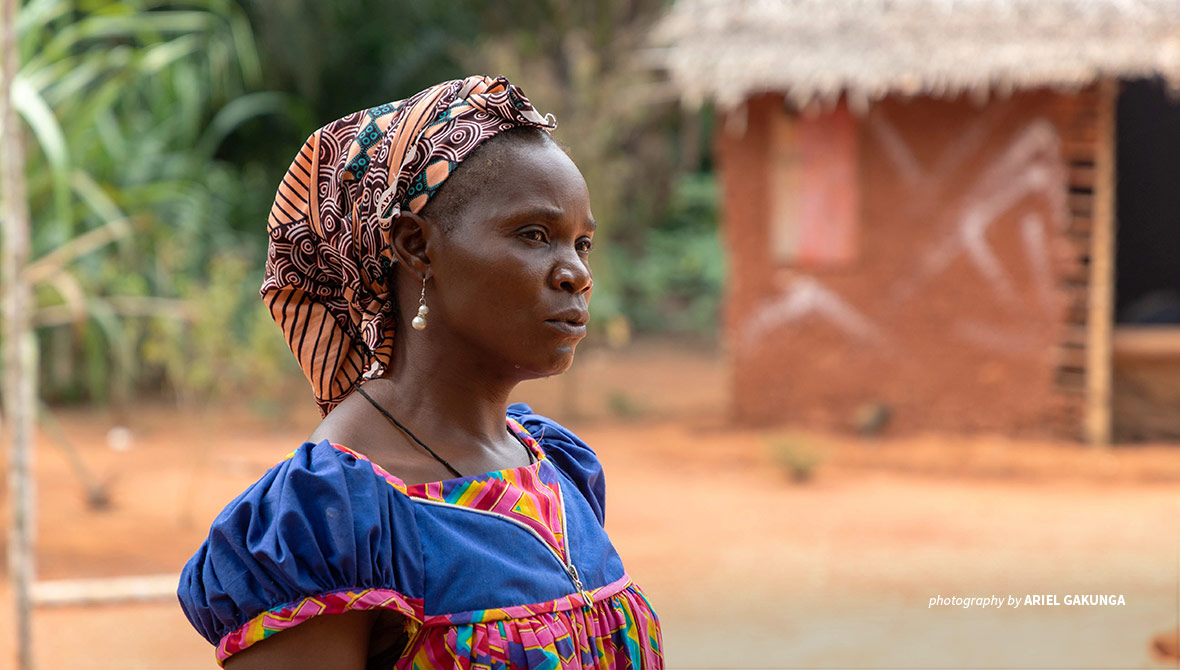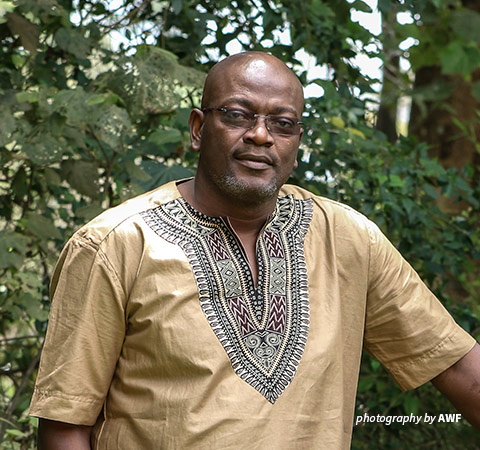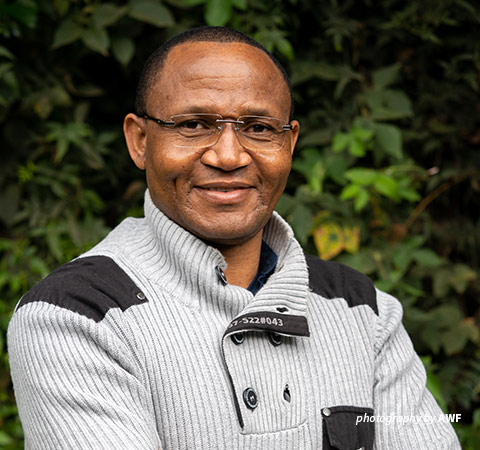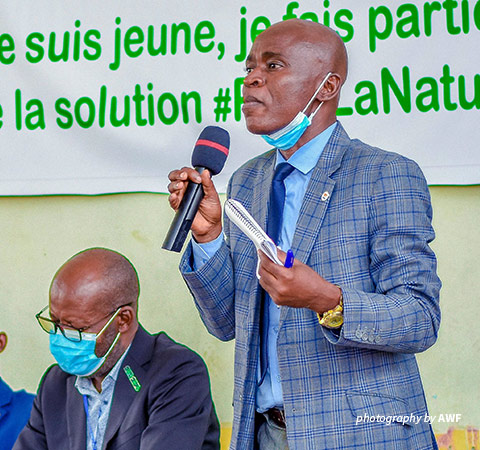Embracing people-centered conservation in Uganda, Cameroon, and DRC

AWF works with communities living near Cameroon's Dja Faunal Reserve to adopt sustainable farming practices and develop conservation-friendly enterprises
African Wildlife Foundation’s leadership in Uganda, Cameroon, and the Democratic Republic of Congo share how strategic partnerships with wildlife authorities and local communities sharpen their response to threats like illegal wildlife trade and habitat loss while improving the lives of people living close to protected areas.
Charly Facheux, Senior Vice President, Conservation Strategy, Impact and Learning
AWF’s successes in Uganda last year are founded on years of strong partnerships that we have nurtured over the years. In April 2022, AWF convened a workshop to develop a comprehensive Kidepo landscape strategy, inviting officials from the Ministry of Tourism, Wildlife and Antiquities, Uganda Wildlife Authority (UWA), local government, and the National Forestry Authority. Community elders, youth, women representatives, and local NGOs also joined the four-day workshop, as well as officials from the Kenya Wildlife Society and South Sudan’s Wildlife Service.

Charly Facheux
AWF’s rights-based conservation approach was at the center of deliberations to demarcate and set a shared vision for the Kidepo landscape. Additionally, the participants identified threats facing biodiversity and devised strategies to elevate conservation and human well-being. Once finalized, the landscape strategy will provide a clear roadmap to achieving conservation and sustainable livelihood improvement impacts at scale.
At the same time, we continued to improve the detection of illegal wildlife products in wildlife crime hotspots. In November 2022, AWF handed over two tracker dogs to UWA deployed to Karuma in the Murchison Falls Conservation Area. In addition to procuring the elite tracker dogs, AWF’s Canines for Conservation program trained six dog handlers selected from UWA’s ranger force.
Unlike the detection dog teams at Entebbe International Airport and Karuma deployed to sniff out smuggled wildlife products, the tracker dogs will pursue wildlife crime offenders at the scene of crimes. As such, the handlers were also trained as first responders to manage the crime scene and handle evidence to be admissible in courts of law.
AWF also supports UWA in responding to human-wildlife conflict by equipping community wildlife scouts — volunteers who serve as first responders to incidences — and working with at-risk communities to engage in wildlife management and champion mitigation measures.
In 2022, AWF provided community wildlife scouts with- uniforms, sets of gumboots, desert boots, raincoats, backpacks, rechargeable LED torches, jungle water bottles and single-occupancy dome tents. The scouts relay real-time information to UWA rangers, avert dangerous human-wildlife conflict incidents, such as elephant invasions, and reduce the likelihood of retaliatory attacks on wildlife. By creating platforms for communities to engage in wildlife management in their landscapes, AWF secures a sustainable future for Uganda’s biodiversity and improves livelihoods.
In the year ahead, AWF will continue to support protected area management strategies in Uganda that improve community empowerment and conservation through the conservancy model approach. At the same time, AWF will build UWA’s capacity to address illegal wildlife trafficking in the country through the Canines for Conservation program. Additionally, to increase support through an increased budget for conservation, AWF will engage national and grassroots government institutions in advocacy and environmental policy.

Norbert Sonne
Norbert Sonne, Country Director, Cameroon
To commemorate the end of the sixth phase of ‘Preserving biodiversity and fragile ecosystems in Central Africa’ (or ECOFAC6) in Cameroon, AWF organized stakeholder meetings in Dja and Faro, where the European Union program has been implemented for the last five years. Convening all stakeholders collaborating for biodiversity preservation in both landscapes, the meetings assessed the program’s impact and discussed future partnerships with the European Union (EU).
Issuing close to €7 million, ECOFAC6 facilitated the development of an integrated landscape approach in the Faro and Dja landscapes with increasingly positive and visible interactions with local communities, indigenous peoples, traditional and administrative authorities as well as the private sector, and other conservation and civil society organizations. The European Union has pledged to continue to support biodiversity conservation in Central Africa while offering sustainable livelihood development, particularly through its new flagship initiative NaturAfrica, which will seek to promote an innovative people-centered approach to conservation through integrated landscape management, sustainable use of biological and natural resources, and inclusive socioeconomic development.
In December 2022, AWF signed a co-financing agreement with the European Union to implement the Team Europe initiative ‘Green Pact and resilience for the northern regions of Cameroon.’ Aligned with Cameroon’s National Development Strategy 2020-2030, the support is a significant win for the Faro landscape. It marks the first direct country-level funding AWF has received from the EU delegation in Cameroon. The program pools the experience of European actors to support climate change adaptation, concerted territorial management, strengthening of agri-food systems, and creation of sustainable socioeconomic opportunities for populations of the Adamaoua, North, and Far North regions of Cameroon.
In recognition of AWF’s significant relationship with the Cameroon government and the Ministry of Forestry and Wildlife, the organization obtained a license to carry out activities throughout the national territory for five years in March 2022. The authorization was sealed with the AWF’s registration in the directory of associations, NGOs, and civil society organizations, and strengthens AWF’s efforts to provide technical and financial assistance to support the country’s conservation and environmental protection efforts.
In 2023, AWF will maintain our partnerships with local and indigenous communities to co-create effective biodiversity conservation solutions. We will continue implementing adaptive economic activities such as planting trees in Faro, cultivating cocoa in Dja, and valuing non-timber forest products in Campo Ma’an. We will engage communities through a rights-based conservation approach that will give priority to information obtained through free, prior and informed consent. With the support of our partners, we aim to give a voice to our communities to tell their stories as guardians and custodians of biodiversity and shine a new light on conservation issues in the country.

Antoine Tabu
Antoine Tabu, Country Coordinator-DRC / Deputy Chief of Party
After providing several law enforcement trainings to the police, the Congolese army and magistrates in the provinces of Tshuapa, Tshopo, Ituri, and Bas Uele to fight against wildlife crime, AWF redoubled its efforts with the support of the Bureau of International Narcotics and Law Enforcement Affairs (INL). Our team established focal points in various departments of the Institute for Nature Conservation (ICCN) as well as in the agencies operating at the Kinshasa and Matadi border control posts to create an information network to fight against illegal wildlife trafficking.
In the Bili-Mbomu landscape in particular, AWF, with support from the U.S. Agency for International Development, carried out a participatory mapping microzoning of the central zone of the Bili-Uere Hunting Domain (DCBU) for the development of a land-use and allocation plan to address conflicting land-use issues. The local population validated the plan and agreed to conserve 4,000 square kilometers rich in biodiversity as an ecological corridor.
To strengthen the monitoring of the DCBU, AWF, with financial support from the European Union’s ECOFAC6 program, retired 40 elderly eco-guards and recruited 40 new people to strengthen the monitoring team. To prevent human rights violations by eco-guards during their duties, AWF has also set up complaints management mechanisms in the Lomako Yokokala Wildlife Reserve and the Iyondji Bonobo Community Reserve in the Maringa Lopori Wamba Landscape.
AWF’s support to ICCN in the DRC aims to strengthen the wildlife authority’s capacity to combat poaching and illegal trafficking of protected species while ensuring the protection of forests and promoting the well-being of people living around protected areas.
In 2023, we will continue to support ICCN in increasing the protection and ecological monitoring of wildlife and implementing landscape-level conservation plans.